Zhang Jun (ambassador)
Zhang Jun (Chinese: 张军, born 15 August 1960) is a Chinese diplomat who has served as the Permanent Representative of China to the United Nations since July 30, 2019.[1][2] From 2007 to 2012, he was the Ambassador Extraordinary and Plenipotentiary of the People's Republic of China to the Kingdom of the Netherlands, and Permanent Representative to the Organisation for the Prohibition of Chemical Weapons.[2] In March 2020, he became President of the United Nations Security Council.[3]
Zhang Jun | |
|---|---|
| 张军 | |
 Zhang in 2022 | |
| Permanent Representative of China to the United Nations | |
| Assumed office July 30, 2019 | |
| Premier | Li Keqiang Li Qiang |
| Leader | Xi Jinping |
| Preceded by | Ma Zhaoxu |
| Personal details | |
| Born | August 15, 1960 Changchun, Jilin, China |
| Education | Jilin University, China (LLB) University of Hull, UK (LLM) |
| Website | chnun.chinamission.org.cn |
Biography
Zhang was born in Changchun, Jilin province in 1960. He earned a Bachelor of Laws from Jilin University in China and a Master of Laws in International Law from the University of Hull in the United Kingdom.[2][4]
In August 2022, Zhang warned that Nancy Pelosi should not visit Taiwan, threatening "This visit is provocative, and if [Pelosi] insists on making it then China will take firm and strong measures to safeguard our national sovereignty and territorial integrity. We allow no one to cross this red line."[5]
References
- Nichols, Michelle (August 2, 2019). "China's new U.N. envoy says Beijing ready to fight U.S. on trade". Reuters. Retrieved April 8, 2020.
- "Biography of Ambassador Zhang Jun". Permanent Mission of the People's Republic of China to the UN. Archived from the original on 26 February 2020. Retrieved 26 February 2020.
- "China assumes presidency of UN Security Council for March". XinhuaNet. Xinhua News Agency. 3 March 2020. Archived from the original on March 3, 2020. Retrieved 3 March 2020.
- "张军大使简历". www.mfa.gov.cn. Retrieved 2022-01-06.
- "Pelosi to visit Taiwan, reports say; China vows 'strong measures' in response". South China Morning Post. 2022-08-02. Retrieved 2022-08-02.
